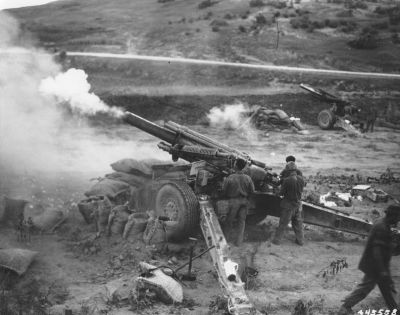 When he arrived at the Korean Eighth Army headquarters, he found a panic-stricken, disorganized lot in an almost pell-mell rout before the advancing Chinese.
When he arrived at the Korean Eighth Army headquarters, he found a panic-stricken, disorganized lot in an almost pell-mell rout before the advancing Chinese.
Since the end of the Second World War, Korea had been divided, north and south, at the 38th parallel (latitude). Communist North Korea invaded South Korea on 6/25/50. It was winning until General Douglas MacArthur, after a successful Inchon landing (as the leader of U.N. forces, primarily the U.S.) on 9/15/50, began pressing North Korean forces all the way back to the Yalu River, on Korea's border with China.
MacArthur was gambling that China would not enter the war. But in November of that year, a 300,000 strong Chinese army poured into Korea and over United Nations' lines. The U.N. was in such rapid retreat it looked as though all of South Korea might soon be in Communist hands. The U.S. Eighth Army was bearing the brunt of this punishment. When it appeared things could not get worse for the U.N. cause, Lt. Gen. Walton Walker, then head of the Eighth Army, was killed in a jeep accident.
At this key juncture, Lt. Gen. Ridgway was assigned to replace Walton. Ridgway had already proven himself as a military commander, having led the Allies' airborne forces on D-Day. And after his achievements in Korea, he would prepare for Eisenhower an assessment of the situation in Vietnam, following the French pull-out from Indochina in the aftermath of their terrible defeat at Dien Bien Phu, in 1954. He correctly advised then President Eisenhower that U.S. involvement in that area would carry an extremely high cost. Due to this evaluation, Ike decided against our intervening. (Unfortunately, Presidents Kennedy and Johnson did not heed this counsel.)
Ridgway was an admirable leader of men in battle. Suffice to say, he could quickly gain the admiration of his troops and was brilliant at finding and exploiting the enemy's greatest weaknesses.
 When he arrived at the Korean Eighth Army headquarters, he found a panic-stricken, disorganized lot in an almost pell-mell rout before the advancing Chinese.
When he arrived at the Korean Eighth Army headquarters, he found a panic-stricken, disorganized lot in an almost pell-mell rout before the advancing Chinese.
He turned things around by forcing commanders to hold their ground, send out intelligence gathering patrols, update their maps with the accurate locations of the Chinese troops, seize the high ground, and then fight!
He was everywhere in those days, especially flying in a little plane that could and did land almost anywhere, often when no landing strip existed, surprising even front line company commanders with his sudden appearances and demands to know the facts about enemy strengths and liabilities and what they intended to do about them. He shared with the Chinese a lack of respect then for the weak, comfort-loving complacence of the average U.S. soldier and officer. He demanded results and let all junior to him know they would be quickly replaced if they did not shape up.
What emerged from his new stress on correct intelligence was that, far from being invulnerable, the Chinese had few big guns and were themselves greatly exposed. He called in all the firepower he could acquire, particularly artillery and bombs. Then he did everything he could, per historian David Halberstam, to "achieve the spiritual awakening of the latent capabilities of this command" (by which he meant to make it again a genuine fighting force to be reckoned with). In the process, he redeemed the Eighth Army and fought the Chinese and North Koreans back to the starting scrimmage, after slaughtering them with heavy weaponry: tanks; aircraft; huge long-range guns; and smaller artillery unit weapons such as the 155mm howitzer shown here.
MacArthur, for all his popularity and prestige, never spent a full day in Korea and made his sometimes wrong-headed decisions at arms length, based on untested theories and assumptions. Ridgway instead emphasized being present at the battleground virtually all the time and with his frontline troops whenever possible, meanwhile improving morale and gathering every scrap of forward intelligence available. Then he decimated the enemy with vastly superior firepower. It is estimated the Chinese and North Koreans lost 1.5 million dead. 33,000 U.S. soldiers died in the Korean War. The South Koreans lost 415,000 killed.
President Truman replaced MacArthur with Ridgway as Allied Commander of the Far East.
A cease-fire commenced in Korea on 7/27/53. The war has never formally ended. An uneasy truce persists, though, after over half a century, with North and South Korea again divided at the 38th parallel. Just as may from now on be true in Iraq, the U.S. keeps tens of thousands of troops indefinitely in South Korea to this day.
Source: Command Performance. David Halberstam in Smithsonian, Vol. 38, No. 8, pages 56-67; November, 2007.